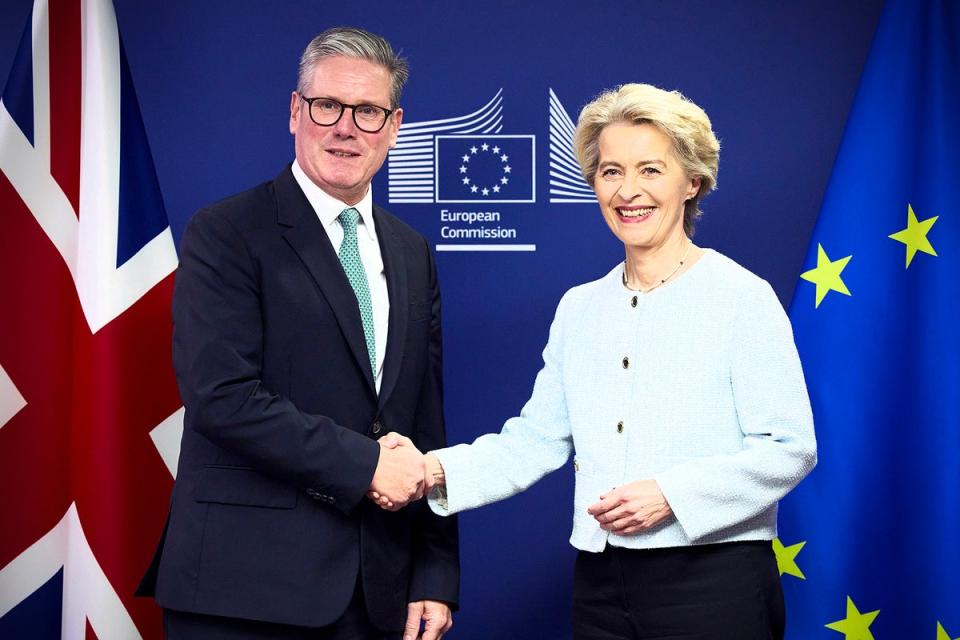Britain has set aside more than £10bn for post-Brexit payments to the EU as the UK continues sending billions to Brussels despite having left the bloc years ago.
To cover the cost of the UK’s divorce from Europe, the government has accounted for £10.6bn in future payments for Brussels staff and diplomats’ pensions, as well as Britain’s pre-existing financial obligations.
Official government figures this week revealed that the provision for continuing “EU liabilities” has fallen from £31.7bn a year ago and £38.7bn the year before.
But the figure still stands at more than £10bn, with critics saying the UK is still “paying vast sums for a terrible Brexit deal”. The revelation comes after Rachel Reeves’ Budget piled £40bn of new taxes on households and businesses – with the chancellor claiming the changes were necessary to fill a black hole in the public finances left by the Conservatives.

SNP MP Stephen Gethins, an ardent anti-Brexit campaigner, added: “Not only is Brexit taking away our rights, hurting business and removing opportunities from young people, it’s also costing a fortune.
“We are unnecessarily crippling our economy and paying billions for the privilege.”
Former armed forces minister Sir Nick Harvey said that as well as continuing payments to the EU, Brexit is still having a significant impact on the economy.
The Independent last month revealed that government estimates show Brexit will cut UK trade by 15 per cent in the long run. This paper then uncovered figures from the independent spending watchdog showing that just 40 per cent of the economic damage of Brexit has materialised, with the majority of the impact yet to be felt.
Sir Nick, a former Lib Dem MP, told The Independent the government is “tinkering around the edges” and that “addressing the economic damage done by Brexit must become a priority”.
And, amid Sir Keir Starmer’s post-Brexit reset with the bloc, Sir Nick said a return to the single market and customs union must be on the table.
Dr Mike Galsworthy, chairman of European Movement UK, said: “The vast sums we are still paying for a terrible Brexit deal that even Kemi Badenoch has admitted isn’t working just shows what a complete disaster every aspect of leaving the EU has been for our country.”
He said Brexit has been “the elephant in the room for far too long”, adding that it is “reckless to ignore the severe damage” it is doing to already stretched public finances.
Sir Keir has embarked on a reset of relations with Brussels after years of acrimony under the Conservatives. The prime minister has held talks with European Commission president Ursula von der Leyen and other EU leaders about how the UK can work more closely with its nearest neighbours.
One of the EU’s key demands in reset talks is a youth mobility scheme, which would let young people live and work between the UK and Europe for several years. Sir Keir has so far refused to consider the arrangement, making major progress difficult.
The Trade and Cooperation Agreement, which currently governs trade between the two, is also to be renewed next year.
Stuart Coster, director of the pro-Brexit Democracy Movement, said the £10.6bn set aside for future payments to the EU was simply “the winding down of our EU membership costs and show the true scale of how much money the EU was costing Britain’s taxpayers and public services”.
“It’s completely hypocritical of EU supporters to now complain about billions of pounds in EU spending that they campaigned to see continue,” he told The Independent. And, in a dig at the government’s repeated complaints about tight public finances, he said: “Rachel Reeves will be thanking Brexit that these EU costs will soon be ending.”
But, after The Independent revealed the figure, Liberal Democrat MP Caroline Voaden said “imagine what the government could do with that money” instead. “It would fill a black hole,” she added.
The former MEP told The Independent: “These figures are sadly not surprising. During the referendum campaign, so many of us sounded the alarm over how much Brexit would cost, not just in 2016 but in the future too.
“While down from last year’s figures, the £10.6bn set aside for future payments to the EU is still an astronomically large amount of money, which would undeniably be better spent on our public services, especially the NHS and social care.”
A Treasury spokesman said: “The 2019 Withdrawal Agreement which was negotiated under a previous government included a settlement for UK to repay outstanding financial debts to the EU.
“This settlement has been paid under successive governments since we left the EU and the figure has reduced significantly over time.
“This government is committed to resetting our relationship with the EU, and following their meeting on 2 October, the Prime Minister and the President of the European Commission agreed to strengthen this and put it on a more solid, stable footing.”
EMEA Tribune is not involved in this news article, it is taken from our partners and or from the News Agencies. Copyright and Credit go to the News Agencies, email news@emeatribune.com Follow our WhatsApp verified Channel





